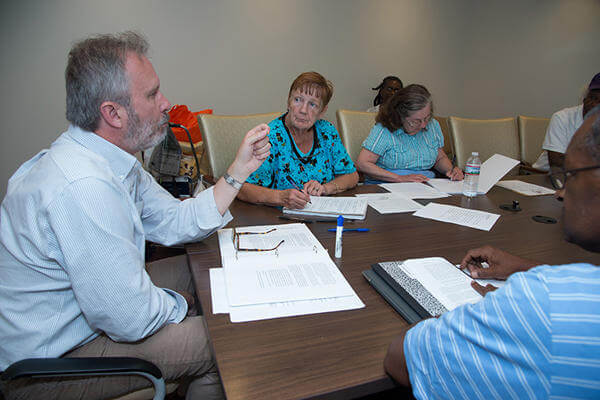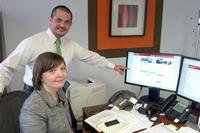"To be nobody but yourself--in a world which is doing its best, night and day, to make you everybody else--means to fight the hardest battle which any human being can fight; and never stop fighting." When I first read this passage by E.E. Cummings, I realized I have been fighting the same battle my whole life. When choosing the direction for my future, I have often accepted jobs based on a compromise between my own dreams and what others thought my dreams should be. This, of course, has led to an unfulfilling career.
Looking back, I always knew that I wanted to work in public service; but I also knew my staunchly conservative father would not be pleased. To him, the government is too big, too intrusive and too wasteful. I see things differently. And yet, his approval means a lot to me and his opinion has certainly influenced my the direction of my career. But I have finally come to understand that I must pursue my own path. After careful deliberation, I am confident that public service is, without a doubt, the right career for me.
Ever since my childhood I have detected in myself a certain compassion and innate desire to help others. I was the kid that dragged in every stray cat or dog I came across--and I still do. When I was eight years old, I rescued a rat from my sister's psychology lab and brought her home. I even coaxed my father into taking Alice--I called her Alice--to the vet when she became ill. But aside from my humanitarian kindness to animals, as a child I learned first-hand about America's need to reform and improve medical care. I spent years of my childhood on crutches and in hospitals because of a tumor that hindered the growth of my leg. Without adequate health insurance and proper care, I might still be on crutches, but I was fortunate. Today, as a public servant, I still desire to help others who are not so fortunate. Providing health care to 44 million uninsured Americans, while keeping insurance affordable, is one of the most difficult challenges facing policymakers. I want to work in state or local government to resolve this health care crisis and ensure that the disadvantaged get the care they need and deserve.
In order to succeed in my endeavors toward public service, I now realize that a master's degree in public policy is essential. But when I graduated from college in 1990, I didn't know how to continue my education, only that I should. For a while, I considered such options as law school or international relations, but I always returned to my desire to impact public life. My career in public policy began as a legislative assistant at the American Legislative Exchange Council (ALEC), a non-profit educational organization that couples voices from the state legislature and the private sector to work on salient policy issues. My enthusiasm for ALEC's mission was evident, as I quickly moved up from legislative assistant to the director of two task forces. As manager of ALEC's task force on federalism and its tax and fiscal policy task force, I explored these issues thoroughly, never quite satiating my appetite for more information and knowledge. I found my integral role in the legislative process to be the most valuable and worthwhile experience I've had in my career to date.
Following ALEC, I took a position as a junior lobbyist for the Automotive Parts and Accessories Association (APAA). As a lobbyist, I voiced the APAA's concern over regulatory and environmental issues affecting the automotive aftermarket. Although I was able to help small automotive parts manufacturers battle the "Big Three" automakers, I quickly realized that being an advocate for the automotive aftermarket was not my calling in life. I wanted to promote policies which had the potential to improve life for the greater public, for I could not see myself spending a lifetime working within an isolated industry.
With that frame of mind, I accepted employment as a policy analyst in the National Federation of Independent Business (NFIB) research department in Washington, D.C. Helping small business owners is a cause close to my heart. For nearly 30 years, my family has owned a barbecue restaurant in the Washington, D.C. area. I've worked in the business at several different times, since the age of 14. Because of my involvement in my family's business, I understand the unique problems facing small business owners. At the NFIB, I valued my contributions because I know small businesses have a huge economic impact on our country and they are unquestionably an important constituency. Nevertheless, I felt uncomfortable working for a special interest group--even for one I deeply cared about.
From my experiences at the APAA and the NFIB, I have learned how I want to shape my future. My goals are now clear: I want to develop and advocate policy decisions that will benefit society as a whole, not just a few influential special interest groups. I want to uncover the objective truth of issues and tackle them in the best interests of the nation, not distort the facts for the benefit of a small group. I know I am able to look beyond partisan politics to solve problems for this country. Because of these unbending desires to reveal truth and to remain committed to fair and equal advancement for all citizens, I think of myself as an ideal candidate for public service.
Additionally, I consider my active interest in politics to aid my pursuit of a career in public policy. I've always found my interest in politics exceptional, ever since my college roommates used to tease me for faithfully watching C-SPAN. However, my faith in the political process began to wane as I witnessed sensible public policy proposals torn apart by partisan conflict. I saw advocacy groups distort facts, and provide extreme, over-blown examples, jeopardizing prudent policy decisions. I observed how powerful elected officials, ensnared in their own partisan rancor, would block fair and balanced legislation which offered the most practical solution for their constituents. But I also encountered many thoughtful and wise people who devote their lives to public service. These devoted individuals inspired me. Like them, I want to be actively involved in the design and delivery of essential government services that improve the lives of the citizens in our society today. I am positive that by avoiding partisanship and urging the private industry, the public sector and non-profit groups to collaborate, many difficult problems can be resolved.
In order to be an effective public servant, I recognize the indispensability of an advanced degree. I've gained a lot of "real world" experience, but I need more training in the fundamentals of economics and statistics, as well as direction in sharpening my analytical and quantitative skills. I also want to devote time to studying the ethical dimensions of policy decisions. In graduate school, I'll have the opportunity to truly understand and appreciate the competing interests surrounding so many complex issues like health care reform, environmental protection and economic policy.
I've chosen Duke's public policy program for several reasons. Duke's program stands out because there is an emphasis on quantitative and analytical skills, which are so critical to policy analysis. As I mentioned, I feel that if I can strengthen my ability to approach problems logically and systematically, I will have succeeded in sharpening skills I consider necessary to succeed in the public realm. And possibly even more importantly, Duke's program bridges the gap between abstract principles and reality. This interdisciplinary approach is essential for responding to today's policy problems. I am excited by the possibility of combining the MPP program with the Health Policy Certificate Program. I am particularly interested in studying the problem of reforming state health to reduce the number of uninsured, and I believe Duke's curriculum will offer me a chance to do just that. From my own research into Duke, I feel confident in my knowledge of the public policy program and its potential to teach me. And after meeting with Helen Ladd, the Director of Graduate Studies, I'm even more convinced that Duke's program is right for me.
On the road "to be nobody but" myself, I've encountered twists and turns, and some detours--it is unquestionably the hardest battle I could fight. However, in the process, I've accumulated a tremendous amount of valuable experience and knowledge. My diversity of experience is my biggest asset. Because I can relate a Duke education to concrete examples from my own past, it is the perfect time for me to join the public policy program. I know that my past can be used to prepare myself for the promises of the future. At Duke, I hope to synthesize the two and truly learn what it means to become myself.





